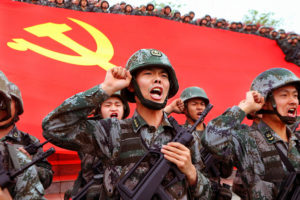After meeting Xi Jinping last week, Joe Biden did his best to paint a rosy image of US-China relations. “As the leaders of our two nations,” he said, “we share a responsibility to show that China and the United States can manage our differences, prevent competition from becoming anything ever near conflict and to find ways to work together on urgent global issues that require our mutual cooperation.”
On paper, Biden’s words appear to be an encouraging sign of thawing tensions. The truth, however, is that the US-China relationship is at its lowest point since they established diplomatic relations in 1979. And much of the blame for that lies with the Biden administration.
While tensions between the two superpowers have been simmering for years, the new administration has taken the confrontation with China to a whole new level. Since he was elected, Biden has taken a much more hard-line approach to Taiwan than Trump, further boosting ties with the country and undermining the “One China” policy, under which the US acknowledges that “China maintains there is but one China and that Taiwan is a part of China”, but doesn’t recognise China’s sovereignty over Taiwan.
Biden has also made clear he believes the US should come to Taiwan’s defence if China were to launch an invasion — irresponsible remarks that have led the White House to clarify this would fall short of American military intervention. And yet, the presence of US warships in the Taiwan Strait and South China Sea has increased significantly this year, to which China has responded by launching extensive military exercises around the self-ruled island. Admiral Michael Gilday, US Chief of Naval Operations, last month went as far as saying that the United States should be prepared “for a 2022 window or potentially a 2023 window” for war over Taiwan with China.
Despite such inflammatory statements, the chances of an all-out war between the US and China remain remote — just like those of a US-Russia conflict. Yet one cannot help but find the notion of a US administration openly raising the possibility of conflicts with the world’s two largest nuclear superpowers at the same time, and acting in ways that make such conflicts more likely, deeply alarming. Even more worrying, the Pentagon’s recent Nuclear Posture Review opened the door to the possibility of a first-strike attack by US nuclear forces.
Taiwan is not the only issue on which Biden is escalating tensions with China. Last month, he also launched what Edward Luce has appropriately called “a full-blown economic war on China”, by introducing a vast array of restrictions on the sale of semiconductor chips to Chinese firms, as well as on the equipment needed to make them. Given the US controls some of the most critical nodes of the global semiconductor supply chain, such as advanced chip research and design, and that China still relies on imports for much of its high-end chip consumption, the impact on the country could be significant — affecting not only the production of goods that require semiconductors but also China’s ability to produce its own chips.
The potential impact of these measures becomes apparent when we consider the extent to which semiconductors have become the lifeblood of modern societies. As the historian Chris Miller writes in his new book Chip War: “Microchips are the new oil — the scarce resource on which the modern world depends. Today, military, economic, and geopolitical power are built on a foundation of computer chips.” All of which means the US embargo could potentially hinder China’s ability to produce a large swathe of goods — not the best news for the world at a time of high inflation driven, in part, by supply chain bottlenecks.
The overlapping nature of the economic and military dimensions of the measure becomes apparent when we consider that more than 90% of the world’s supplies of advanced chips are produced by a single company, Semiconductor Manufacturing Company (TSMC), which happens to be located in Taiwan. This partly explains the heightened tensions around the island. It also means the ban could have serious geopolitical implications, potentially prohibiting Taiwan from selling semiconductor manufacturing equipment and advanced chips to Chinese companies.
That said, China already produces about 15% of semiconductors globally, and it’s only a matter of time before it figures out how to produce more chips on its own, even at the higher end of the technological scale. Some analysts even believe the move may actually end up hurting the US and its Western allies more than China, in a way not dissimilar to the way in which anti-Russian sanctions have ended up dramatically backfiring on Europe, further disrupting global supply chains that were already severely unsettled by the pandemic and then the conflict in Ukraine.
Yet such economic reasoning has its limits. Many in the US establishment view war with China as inevitable, and so the move could be understood as a way to primarily weaken China’s military capabilities in view of the “big one”: a US-China military confrontation. As US Strategic Command head Admiral Charles Richard recently said: “This Ukraine crisis that we’re in right now, this is just the warm-up. The big one is coming. And it isn’t going to be very long before we’re going to get tested in ways that we haven’t been tested in a long time.” This may be seen simply as an attempt by the Pentagon and to ramp up fears in order to increase their bloated budgets. But ballooning defence budgets also tend to be self-fulfilling, increasing the demand for actual wars.
The most appalling aspect of all this is that there’s nothing inevitable about a US-China war. If China represented a security threat to America’s survival, this might be the case. But it does not. The problem with China, as the recently released US National Security Strategy emphasised, is that it is the only competitor of the US with “the intention and, increasingly, the capacity to reshape the international order in favour of one that tilts the global playing field to its benefit”, meaning the US should aim to “out-compete” China. The Pentagon’s latest National Defense Strategy also concludes that China “remains our most consequential strategic competitor for the coming decades”, due to its “coercive and increasingly aggressive endeavour to refashion the Indo-Pacific region and the international system to suit its interests and authoritarian preferences”.
In other words, China is not a threat because it undermines US security interests, but because it will want to shape — and indeed is already shaping — the global political and economic order in a manner that serves its own interests, rather than just those of the US and other Western nations, as has been the case since the Second World War. The real threat, then, is not to America but to America’s hegemonic unipolarist ambitions and those who benefit from it. Recognising this is not about being “anti-China” or “pro-China” — it’s about acknowledging that a peaceful world order rests on our ability, as Westerners, to accept a more equitable distribution of global resources, and to tolerate different national cultures, institutional arrangements and practices, even if we find them disagreeable.
And yes, this will also depend on Western countries becoming less reliant on far-flung countries and overstretched supply chains for the provision of a wide range of industrial goods. But the current trend towards deglobalisation and reshoring — in itself a positive thing, given the disastrous consequences of hyperglobalisation on Western workers and manufacturing bases — is not driven by the desire to create more just, sustainable and self-sufficient economies, but rather by the desire to crush China’s rise, even at the expense of the well-being of Western citizens.
Take, for instance, Biden’s focus on boosting America’s chip-making capacity. While semiconductors may be strategically important in “out-competing” China, they’re not particularly labour-intensive. Reshoring traditional manufacturing sectors would benefit US workers much more — but it’s not their needs that are driving policy. As the Harvard economist Dani Rodrik writes: “It is good that we are now moving away from [hyperglobalisation], given how damaging it was to our social fabric… Unfortunately, the great powers seem to have chosen a different, even worse path. They are now handing the keys to the global economy to their national-security establishments, jeopardising both global peace and prosperity.”
The good news is that the Ukraine crisis has shown that the days when the US could single-handedly dictate global politics are long gone: most countries have not followed America in slapping sanctions on Russia. On the contrary, more than a dozen countries have formally applied to join the BRICS grouping, following its decision to allow new members earlier this year. If accepted, the new BRICS members would create an entity with a GDP 30% larger than the United States, over 50% of the global population and in control of 60% of global gas reserves.
And when it comes to the prospect of engaging in a Cold War 2.0 with China, the US appears even more isolated — even vis-à-vis its closest allies. Recent reports suggest that Washington failed to convince its allies to take part in the sanctions and had to proceed unilaterally. This is unsurprising, considering the devastating consequences of Europe’s ill-advised decision to join the US in waging a proxy war against Russia. Thus Rishi Sunak recently hinted he will abandon plans to declare China a “threat” to national security as part of a major review of British foreign policy, while Emmanuel Macron, following a face-to-face meeting with Xi at the G20, made clear (according to Beijing’s readout) that he “hopes to continue working with China and deepen cooperation in areas such as trade, economy, aviation and civilian nuclear energy”.
But the country that has most openly defied US consensus on China is also the one that is suffering the most — Germany. A few days after America imposed its sanctions, German Chancellor Olaf Scholz stated that decoupling from China was “the wrong answer”; earlier this month, he went to Beijing and met with Xi Jinping, accompanied by a business delegation of powerful German CEOs. In an essay in Politico, Scholz later explained the reasoning behind his trip: “No country is the ‘backyard’ of another. What is true in Europe regarding Ukraine is also true in Asia, Africa or Latin America. It is here that new centres of power are emerging in a multipolar world, and we aim to establish and expand partnerships with all of them. Thus, in recent months, we have carried out in-depth coordination at the international level.”
Understandably, many interpreted this as a rebuttal of America’s new Cold War, bloc-minded strategy. It remains to be seen whether this signals Germany’s intention to rebuild a trans-Eurasian geopolitical corridor. But it does show that it’s not China that is becoming increasingly isolated from the world — but the United States. The latter would do well to accept that the days of American unipolarity are over, and its attempts to drag the world into a war with China will only accelerate its decline.
***
The definition of “One China policy” has been amended for clarity.
Disclaimer
Some of the posts we share are controversial and we do not necessarily agree with them in the whole extend. Sometimes we agree with the content or part of it but we do not agree with the narration or language. Nevertheless we find them somehow interesting, valuable and/or informative or we share them, because we strongly believe in freedom of speech, free press and journalism. We strongly encourage you to have a critical approach to all the content, do your own research and analysis to build your own opinion.
We would be glad to have your feedback.
Source: UnHerd Read the original article here: https://unherd.com/




